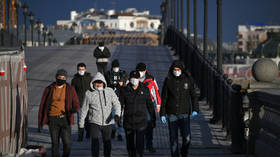Russia’s tough new rules for foreign workers
Facing growing anti-migration sentiment, Europe’s largest state is rolling out a drastic new policy.
A new law that comes into force this week will see virtually all foreigners living in Russia, even young children, required to take a battery of tests on a regular basis to avoid falling foul of the immigration authorities, in a move unprecedented virtually anywhere in the world. Under the rules, which take effect from Wednesday, foreign nationals must submit a quarterly health certificate that proves they aren’t suffering from communicable diseases or taking drugs.
As part of the process, those living in the country who are not Russian or Belarusian citizens, and do not hold permanent or temporary residence permits, will have to attend a clinic every three months and pay for blood tests, sexual health checks, urine analysis, and even chest X-rays. Foreigners will also have to submit fingerprints and identity photos for official records. Only children under the age of six are exempted.
Adding to the complexity, a number of examinations will also have to be undertaken at specialist government tuberculosis and addiction clinics and, for those in Moscow, the results will have to be handed in – in person – to the Sakharovo migration center, around two and a half hours on public transport from the heart of the capital. Those who refuse can see their visas revoked or not renewed.
A controversial plan
The amendment introducing the restrictive new measures was backed by Russia’s parliament over the summer, but only fully explained publicly a few weeks ago. A letter accompanying it said the changes were justified by the need to prevent the “infiltration and spread of dangerous infectious diseases in Russia.” However, the scientific evidence for testing young children for syphilis and subjecting them to medically unnecessary radiation four times a year has not yet been released, and similar public health policies have never been tried elsewhere in the world. Furthermore, given Russia has far higher domestic rates of diseases like tuberculosis and HIV than most Western nations, the rationale for regularly testing foreigners and not expanding the domestic screening of citizens is unclear. Many familiar with bureaucratic processes and medical examinations in Russia fear that the processes of undergoing tests and submitting the paperwork will take a day each, particularly given the sudden dramatic increase on administrative infrastructure.
The country’s so-called ‘expat’ community has been vocal in its opposition to the law, with a number of business groups lining up to warn that it will destroy the country’s hopes at competing for highly skilled migrants. “It’s been a long time since a single legislative act has caused such a huge wave of misunderstanding, frustration and indignation among thousands of foreign managers,” Matthias Schepp, the chairman of the board of the Russian-German Chamber of Foreign Trade blasted. An appeal from ten separate trade bodies, including the US Chamber of Commerce, has asked for the measures to be revisited, exempting specialist workers from the rules.
Migrant outrage
However, the lobby groups objecting to the rules have spared little concern for the bulk of Russia’s non-native workers, often from poorer Central Asian and Eastern European nations once part of the Soviet Union. Instead of opposing the measures altogether, they have opted to ask that the majority of Westerners be exempted from it. The world’s largest country estimates it had, before the Covid-19 pandemic, around 10.1 million foreigners permanently residing within its borders, according to 2019 estimates. By far the largest groups consistently emigrating are Ukrainians, followed by Tajiks, Azerbaijanis, Kazakhs, Uzbeks, Moldovans, and Kyrgyz. Many work in manual labor roles, on construction sites, farms, driving taxis, and in service jobs.
In recent years, tensions have flared between Russians and the latest generation of workers originating from Central Asia. A spate of news stories and viral social media have identified “migrants” as responsible for horrific rapes and other attacks, with around 200 people taking to the streets in one village outside Moscow after foreigners were blamed for the sexual assault and murder of a 65-year-old woman. Locals in Buzhaninovo formed a crowd outside a building said to be home to many workers from Tajikistan, demanding the police take action.
In another set of high-profile incidents, groups of men, largely believed to be from Uzbekistan and Kyrgyzstan, were identified as being behind mass brawls in the streets of the Russian capital. Nearly 400 people were expelled and barred from re-entering the country for 40 years each after being detained over the incidents, with videos of the clashes being shared widely online. In response to the spate of violence, Moscow Mayor Sergey Sobyanin wrote in a statement that police had carried out “hard raids” in a zero-tolerance policy toward those involved. “We are not satisfied to have such guests,” he went on, explaining that “the security forces have opened 800 criminal cases, deported 200 people and banned another 17,500 from entering the country.” Sobaynin urged foreigners to “behave in an appropriate manner on their visits” to the Russian capital.
Workers wanted
However, the high-profile outrage over the incidents is at odds with Russia’s economic dependence on foreign labor, and the sharp fall in the number of foreign workers in the country since the start of the pandemic. In December last year, the Ministry of Internal Affairs estimated that almost half of all immigrants living in Russia had departed, with Moscow seeing a 40% drop in overseas workers.
In April, Kremlin Press Secretary Dmitry Peskov was asked about a recent poll that showed almost a quarter of Russians have negative attitudes toward migrants, with the official insisting that “I can only set out the reality that there have been very few migrants in our country over the past year, and we really, really lack these migrants for the implementation of ambitious plans.”
The month before, Russia’s Minister of Construction, Housing and Utilities Irek Fayzullin warned that 1.2 million extra employees were needed to fill labor shortages in the construction workforce, with building projects booming and a drastic shortfall in manpower. “A large number of builders who came from the near-abroad [former Soviet states] were forced to leave due to the coronavirus,” he said, announcing that Moscow was working on a “complex mechanism” to encourage workers to come to the country.
In addition to builders and other manual laborers, Deputy Prime Minister Tatyana Golikova has cautioned that an insufficient number of “high quality personnel” are choosing to move to Russia. She added that the Covid-19 pandemic demonstrated that “we need changes in favor of high-quality migration, attracting very qualified personnel to the country, who can work, even in restricted activities.”
President Vladimir Putin has also defended the need for Russia to bring in migrants to fuel the economy, despite facing criticism from nationalists for not taking a harder line on the issue. In February, Putin appeared to hit out at comments from Vladimir Zhirinovsky, the leader of the ultra-nationalist LDPR party, who said that integration of Central Asians into society is “impossible,” and alleged that foreigners “carry two grams of drugs in their pockets for personal consumption. But they will sell it here.” In a stern rebuke against xenophobia, the Russian president argued that “caveman nationalism, with the slogan ‘Russia is only for Russians,’ only harms Russians, only harms Russia.”
In March last year, Putin approved guidelines to reform the visa and citizenship policies, warning that existing rules “are not clear” and bemoaning that “levels of digitalization remain low.” It is not clear how these guidelines are reflected in the new rules for foreigners, with paperwork required to be handed in by hand many miles outside the capital.
At the same time, however, the Russian leader has said that it is not enough to simply accept migrants, and that they should be assimilated into society as well. In a speech earlier this month, Putin said that “we need to make sure that people who would like to come to work here prepare for this trip to our country and for work here while in their homelands.” According to him, foreigners should study the Russian language, laws, and customs, as well as their civic rights before making the move.
Two tier system?
The rule change, due to come into force in a matter of days, is unlikely to do much to help Russia attract either skilled or unskilled migrants in its current form. However, the loudest calls for a reappraisal appear to be coming from those eager for well-heeled foreign specialists to be given a free pass, seemingly offended at being included among ‘regular migrants,’ despite having similarly moved to the country for economic opportunities. At the same time, there has been little discussion of how it will affect those less able to pay for the examinations or take time off work, even if that work has rarely been in as high demand.







Comments are closed.